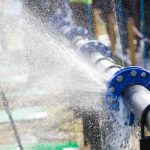Common Flange Leaks & How to Fix

1. Improper installation
One of the primary causes of flange leaks is improper installation. When a flange is not installed correctly, it can lead to leaks at the gasket or bolted joint. To fix this issue, it is crucial to follow proper installation procedures. This includes ensuring that the flange faces are parallel and in contact with each other, using the appropriate gasket material, tightening the bolts in the correct sequence and torque, and applying a suitable sealant or lubricant.
2. Gasket failure
Gaskets play a critical role in preventing leakage between flanges. However, gasket failure can occur due to various factors such as degradation, over-tightening, or insufficient compression. If the leak is caused by a damaged or deteriorated gasket, it must be replaced with a new one. It is essential to select a gasket material that is compatible with the process conditions, ensuring it has the appropriate thickness, temperature, and pressure ratings.
3. Bolt tension
Insufficient or uneven bolt tension can lead to flange leaks. If the bolts are not tightened adequately, the gasket may not be compressed enough to form a tight seal. Alternatively, if the bolts are over-tightened, it can damage the gasket or cause the flange to deform, resulting in leaks. To fix this issue, it is essential to follow the manufacturer’s recommended bolt tightening procedure, using a calibrated torque wrench or a tensioning device. The bolts should be tightened in a cross-pattern, gradually increasing the tension until the specified torque is achieved.
4. Corrosion and erosion
Corrosion and erosion are common problems in flanged connections, particularly in industries dealing with corrosive or abrasive substances. Over time, corrosion can weaken the flange material, causing leaks. Erosion can also lead to the thinning of the flange surface, making it more susceptible to leakage. To fix these issues, it is necessary to inspect the flange regularly for signs of corrosion or erosion. If any damage is identified, the affected area should be repaired or replaced. Applying protective coatings can also help prevent future corrosion or erosion.
5. Thermal expansion mismatch
In situations where there are significant temperature variations in the system, thermal expansion mismatch can occur, leading to flange leaks. This can happen when different materials with different coefficients of thermal expansion are used. To fix this issue, it is crucial to consider the thermal expansion properties of the materials and select appropriate gaskets that can accommodate the movement. Additionally, the use of expansion joints or flexible connectors can help absorb thermal expansion and prevent leaks.
6. Insufficient or incorrect sealing material
Using the wrong type of sealing material or an inadequate amount of it can result in flange leaks. The sealing material should be compatible with the process fluid and be able to withstand the required temperature and pressure conditions. Furthermore, the correct amount of sealing material should be applied to ensure proper compression and a tight seal. If a flange leak is identified due to an incorrect or insufficient sealing material, it must be replaced with the appropriate material.
Summary
Flange leaks can occur due to several reasons, including improper installation, gasket failure, bolt tension issues, corrosion and erosion, thermal expansion mismatch, and insufficient or incorrect sealing material. To fix these issues, it is important to follow proper installation procedures, replace damaged gaskets, ensure adequate bolt tension, address corrosion or erosion problems, consider thermal expansion factors, and use the correct sealing material. Regular maintenance and inspection of flanged connections are crucial to identify and address any potential leaks promptly, preventing costly downtime and ensuring the overall integrity of the system.
Need Hose & Fittings Specialists in San Jose, CA?
Welcome Royal Brass Incorporated! We are your 3rd generation, family-owned, local hose supplier! Our family has dedicated our services to supplying northern California with all types of hoses, fittings, flanges, regulators, valves, adapters, and gauges. We pride ourselves on having the most extensive inventory in northern California. Our inventory ensures that we can fix most products on site, the same day. Here at Royal Brass Incorporated, we only hire qualified individuals who are trained in factory sales. Our fully stocked warehouses ensure that we can fill your hydraulic and pneumatic hose, tubing, and fitting needs on time, every time. High-quality customer service is our goal and has been since 1952. Contact us today!
Categorised in: Flanges





